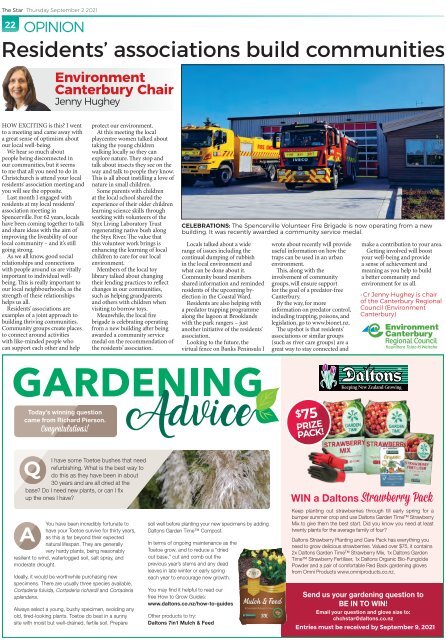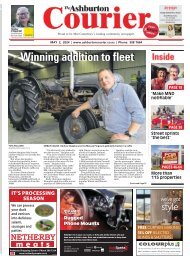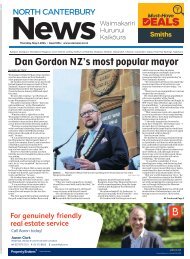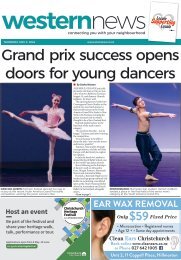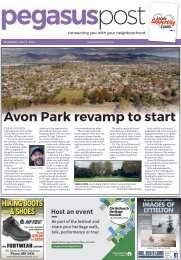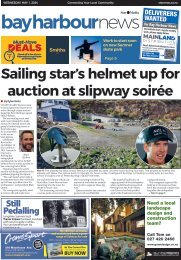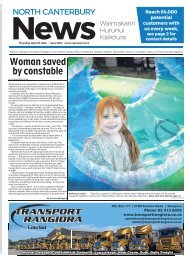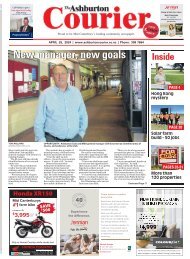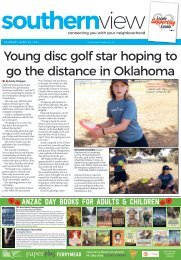The Star: September 02, 2021
Create successful ePaper yourself
Turn your PDF publications into a flip-book with our unique Google optimized e-Paper software.
<strong>The</strong> <strong>Star</strong> Thursday <strong>September</strong> 2 2<strong>02</strong>1<br />
22<br />
OPINION<br />
ince Environment Canterbury<br />
climate-change emergency<br />
Residents’ associations build communities<br />
by sea-level rise this century and threatened and facing increased<br />
our productive and protected land pressures due to river system<br />
Environment<br />
jeopardised by the arrival and change.<br />
spread of new, exotic weeds and Wetlands are also ecosystems<br />
Canterbury Chair<br />
pests from warmer climates. at-risk nationally and regionally,<br />
Jenny Hughey<br />
All these eventualities have degraded by draining, damming<br />
to be planned and prepared for, and diversion affecting their<br />
and enhance that work.<br />
fleet hybrid or long-range electric<br />
and Environment Canterbury ability to sequester carbon,<br />
HOW That EXCITING work included is this? setting I went protect by 2<strong>02</strong>2. our Carbon environment. emissions from<br />
will remain in the vanguard of cleanse freshwater and mitigate<br />
up to a meeting climate-change and came integration away with air At this travel meeting across the local organisation<br />
these climate change efforts. flooding, as well as impacting on<br />
a great sense of optimism about playcentre women talked about<br />
One example is the $40 million biodiversity and mahinga kai.<br />
programme in the Long-term Plan are offset via our own biodiversity<br />
our local well-being.<br />
taking the young children<br />
Waimakariri River flood<br />
With biosecurity, we are<br />
2018-28, ensuring climate change programmes.<br />
We hear so much about walking locally so they can<br />
protection project, completed putting greater emphasis on the<br />
was actively considered across According to a Madworld report<br />
people being disconnected in explore nature. <strong>The</strong>y stop and late last year. <strong>The</strong> network of risks of new pests establishing<br />
workstreams, increasing visibility in 2019, our gross emissions were<br />
our communities, but it seems talk about insects they see on the floodgates and stopbanks will in Canterbury. Warming<br />
of the science and what we know 2253 tonnes of carbon dioxide<br />
to me that all you need to do in way and talk to people they know. protect half a million people and temperatures, changing soils and<br />
about the impact of climate (CO2) equivalent, compared with<br />
Christchurch is attend your local This is all about instilling a love of $8 billion of community and new land uses mean new weeds<br />
change on Canterbury, and liaising removals of 7883 tonnes of CO2-<br />
residents’ association meeting and nature in small children.<br />
business assets from a possible especially, will be able to gain a<br />
on the issue with iwi and regional equivalent through our efficiency<br />
you will see the opposite.<br />
Some parents with children “super flood”.<br />
better foothold across the region.<br />
partners, other local authorities efforts and from forestry planting<br />
Last month I engaged with at the local school shared the<br />
<strong>The</strong> last major flood was in More broadly, we have to<br />
and central government.<br />
across 2700 hectares.<br />
residents at my local residents’ experience of their older children December 1957, when parts curb reliance on fossil fuels and<br />
As an organisation, we have <strong>The</strong> changing climate will pose<br />
association meeting in<br />
learning science skills through of Coutts Island in Belfast and find environmentally suitable<br />
also<br />
Spencerville.<br />
made significant<br />
For 62 years,<br />
progress<br />
locals<br />
in<br />
working<br />
many risks<br />
with<br />
to<br />
volunteers<br />
life and livelihood<br />
of the Kainga were swamped by river alternatives, such as electricity and<br />
addressing have been coming our own together greenhousegas<br />
and emissions, share ideas with with our the aim of regenerating we have seen native how bush occasional, CELEBRATIONS:<br />
to talk Styx<br />
in Canterbury.<br />
Living Laboratory<br />
In recent<br />
Trust<br />
years flow peaking at 3990<br />
<strong>The</strong> Spencerville<br />
cubic<br />
Volunteer<br />
hydrogen,<br />
Fire<br />
to power<br />
Brigade<br />
our public<br />
is now operating from a new<br />
along<br />
Christchurch improving the building liveability receiving of our a the but Styx extreme, River. <strong>The</strong> weather value events that have<br />
building. metres It per was second recently (cumecs). awarded a community transport. service medal.<br />
<strong>The</strong> protection scheme has been When my predecessor Steve<br />
“market-leading” local community – energy and it’s efficiency still this had volunteer huge effects work on brings residents is and<br />
Locals designed talked to about defend a wide Christchurch wrote Lowndes about recently retired will as provide chair of make a contribution to your area.<br />
rating going strong. of 5.0 out of 6 in the year enhancing infrastructure the learning around of the local South range from of issues a flood including of as much the as 6500 useful this information council late on how last year, the he Getting involved will boost<br />
to As February we all know, on the good National social children Island. to care for our local continual cumecs. dumping of rubbish traps can highlighted be used in some an urban of the big your well-being and provide<br />
Australian relationships Built and Environment<br />
connections environment. <strong>The</strong> driest parts of our region, in the Environment local environment Canterbury’s and environment. changes on the way. He was a sense of achievement and<br />
Rating with people System around New us Zealand. are vitally along Members the Marlborough of the local toy coast and what leadership can be done of biodiversity about it. and This, optimistic along with we the would be able to meaning as you help to build<br />
important <strong>The</strong> building’s to individual features wellbeing.<br />
solar This panels is really which important can to their Plains, lending are expected practices to reflect get even shared underpinned information by and climate-change<br />
reminded groups, climate will ensure change support and sustainability. environment for us all.<br />
include library across talked much about of the changing Canterbury Community biosecurity board programmes members is also involvement deal with of community the “pressing issues” a of better community and<br />
184<br />
generate our local more neighbourhoods, than 55,000 as the changes drier. North-westerly in our communities, storms are residents concerns. of the upcoming byelection<br />
Canterbury’s in the Coastal distinct Ward. braided Canterbury. community, and as a council, • Cr Jenny Hughey is chair<br />
for the goal I share of a his predator-free confidence. As a<br />
kilowatt strength of hours these of relationships electricity per such predicted as helping to become grandparents more intense,<br />
year. helps us all.<br />
and with others torrential with children alpine rainstorms when Residents rivers and are unique also helping wetlands with face By the we way, are taking for more some bold steps of to the Canterbury Regional<br />
Residents’ <strong>The</strong>re has associations been a 26% reduction are visiting turning to our borrow braided toys. rivers into a predator many challenges. trapping programme <strong>The</strong> rivers form information ensure on we predator are in a better control, place<br />
Council<br />
to<br />
(Environment<br />
per examples staff member of a joint in approach emissions to roaring Meanwhile, rapids, the fuelling local fire landslides along a vital the lagoon ecological at Brooklands link provide including cope trapping, with the poisons, changing and climate<br />
Canterbury)<br />
since building 30 June thriving 2010. communities. We now have brigade and causing is celebrating widespread operating erosion. with an the abundant park rangers food – supply just and legislation, and the go to tests www.bionet.nz.<br />
it will set us. But<br />
access Community to electric groups and create hybrid places<br />
It’s a year<br />
from<br />
since<br />
a new building after<br />
Environment<br />
being another initiative of the residents’ Canterbury<br />
<strong>The</strong> upshot is that residents’<br />
vehicles<br />
to connect<br />
and<br />
around<br />
hope to<br />
activities<br />
have half our<br />
awarded Canterbury’s a community coastal<br />
communities will be<br />
service<br />
threatened association.<br />
nesting grounds for 26 species of there will always be a need to do<br />
native birds – most classified as associations more. or similar groups<br />
with like-minded people who medal on the recommendation of<br />
can support each other and help the residents’ association.<br />
Looking to the future, the (such as river care groups) are a<br />
virtual fence on Banks Peninsula I great way to stay connected and<br />
declared a climate-change emergency<br />
JENNY HUGHEY explains what<br />
the council has been doing.<br />
<strong>The</strong> formal declaration of a<br />
state of climate emergency across<br />
Canterbury was one of the most<br />
serious, and colourful, moments<br />
in the regional council’s more than<br />
30-year history.<br />
A year ago this Saturday,<br />
at 11.49am, Environment<br />
Canterbury became New Zealand’s<br />
first council to proclaim such an<br />
emergency, formally dedicating<br />
itself to consideration of climate<br />
change at the heart of all it does.<br />
<strong>The</strong> declaration highlighted<br />
that all the work Environment<br />
Canterbury does – from<br />
freshwater management to<br />
biodiversity and biosecurity,<br />
transport and urban development<br />
to air quality, and also regional<br />
leadership – has a climate change<br />
focus.<br />
Currently, under the Resource<br />
Management Act, regional<br />
councils are required only to adapt<br />
to climate change, not mitigate<br />
it – that responsibility is the<br />
Government’s, but could change.<br />
Even in ‘adapt mode’ many<br />
of Environment Canterbury’s<br />
existing policies and plans already<br />
contribute to reduced emissions.<br />
In declaring the climate<br />
emergency, the Council noted it<br />
would continue to show leadership<br />
on climate-change and do so<br />
without adding new programmes<br />
at ratepayers’ expense. It also gave<br />
staff a clear mandate to continue<br />
and enhance that work.<br />
That work included setting<br />
up a climate-change integration<br />
programme in the Long-term Plan<br />
2018-28, ensuring climate change<br />
was actively considered across<br />
workstreams, increasing visibility<br />
of the science and what we know<br />
about the impact of climate<br />
change on Canterbury, and liaising<br />
on the issue with iwi and regional<br />
partners, other local authorities<br />
and central government.<br />
As an organisation, we have<br />
also made significant progress in<br />
addressing our own greenhousegas<br />
emissions, with our<br />
Christchurch building receiving a<br />
“market-leading” energy efficiency<br />
rating of 5.0 out of 6 in the year<br />
to February on the National<br />
Australian Built Environment<br />
Rating System New Zealand.<br />
<strong>The</strong> building’s features include<br />
184 solar panels which can<br />
generate more than 55,000<br />
kilowatt hours of electricity per<br />
year.<br />
<strong>The</strong>re has been a 26% reduction<br />
per staff member in emissions<br />
since 30 June 2010. We now have<br />
access to electric and hybrid<br />
vehicles and hope to have half our<br />
Environment<br />
Canterbury Chair<br />
Jenny Hughey<br />
fleet hybrid or long-range electric<br />
by 2<strong>02</strong>2. Carbon emissions from<br />
air travel across the organisation<br />
are offset via our own biodiversity<br />
programmes.<br />
According to a Madworld report<br />
in 2019, our gross emissions were<br />
2253 tonnes of carbon dioxide<br />
(CO2) equivalent, compared with<br />
removals of 7883 tonnes of CO2-<br />
equivalent through our efficiency<br />
efforts and from forestry planting<br />
across 2700 hectares.<br />
<strong>The</strong> changing climate will pose<br />
many risks to life and livelihood<br />
in Canterbury. In recent years<br />
we have seen how occasional,<br />
but extreme, weather events have<br />
had huge effects on residents and<br />
infrastructure around the South<br />
Island.<br />
<strong>The</strong> driest parts of our region,<br />
along the Marlborough coast and<br />
across much of the Canterbury<br />
Plains, are expected to get even<br />
drier. North-westerly storms are<br />
predicted to become more intense,<br />
with torrential alpine rainstorms<br />
turning our braided rivers into<br />
roaring rapids, fuelling landslides<br />
and causing widespread erosion.<br />
Canterbury’s coastal<br />
communities will be threatened<br />
by sea-level rise this century and<br />
our productive and protected land<br />
jeopardised by the arrival and<br />
spread of new, exotic weeds and<br />
pests from warmer climates.<br />
All these eventualities have<br />
to be planned and prepared for,<br />
and Environment Canterbury<br />
will remain in the vanguard of<br />
these climate change efforts.<br />
One example is the $40 million<br />
Waimakariri River flood<br />
protection project, completed<br />
late last year. <strong>The</strong> network of<br />
floodgates and stopbanks will<br />
protect half a million people and<br />
$8 billion of community and<br />
business assets from a possible<br />
“super flood”.<br />
<strong>The</strong> last major flood was in<br />
December 1957, when parts<br />
of Coutts Island in Belfast and<br />
Kainga were swamped by river<br />
flow peaking at 3990 cubic<br />
metres per second (cumecs).<br />
<strong>The</strong> protection scheme has been<br />
designed to defend Christchurch<br />
from a flood of as much as 6500<br />
cumecs.<br />
Environment Canterbury’s<br />
leadership of biodiversity and<br />
biosecurity programmes is also<br />
underpinned by climate-change<br />
concerns.<br />
Canterbury’s distinct braided<br />
rivers and unique wetlands face<br />
many challenges. <strong>The</strong> rivers form<br />
a vital ecological link and provide<br />
an abundant food supply and<br />
nesting grounds for 26 species of<br />
native birds – most classified as<br />
threatened and facing increased<br />
pressures due to river system<br />
change.<br />
Wetlands are also ecosystems<br />
at-risk nationally and regionally,<br />
degraded by draining, damming<br />
and diversion affecting their<br />
ability to sequester carbon,<br />
cleanse freshwater and mitigate<br />
flooding, as well as impacting on<br />
biodiversity and mahinga kai.<br />
With biosecurity, we are<br />
putting greater emphasis on the<br />
risks of new pests establishing<br />
in Canterbury. Warming<br />
temperatures, changing soils and<br />
new land uses mean new weeds<br />
especially, will be able to gain a<br />
better foothold across the region.<br />
More broadly, we have to<br />
curb reliance on fossil fuels and<br />
find environmentally suitable<br />
alternatives, such as electricity and<br />
hydrogen, to power our public<br />
transport.<br />
When my predecessor Steve<br />
Lowndes retired as chair of<br />
this council late last year, he<br />
highlighted some of the big<br />
changes on the way. He was<br />
optimistic we would be able to<br />
deal with the “pressing issues” of<br />
climate change and sustainability.<br />
I share his confidence. As a<br />
community, and as a council,<br />
we are taking some bold steps to<br />
ensure we are in a better place to<br />
cope with the changing climate<br />
and the tests it will set us. But<br />
there will always be a need to do<br />
more.<br />
Entries must be received by <strong>September</strong> 9, 2<strong>02</strong>1


